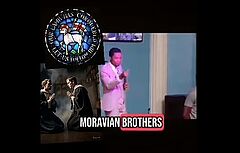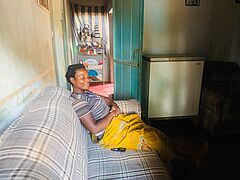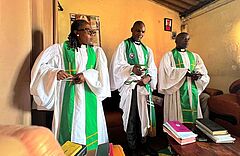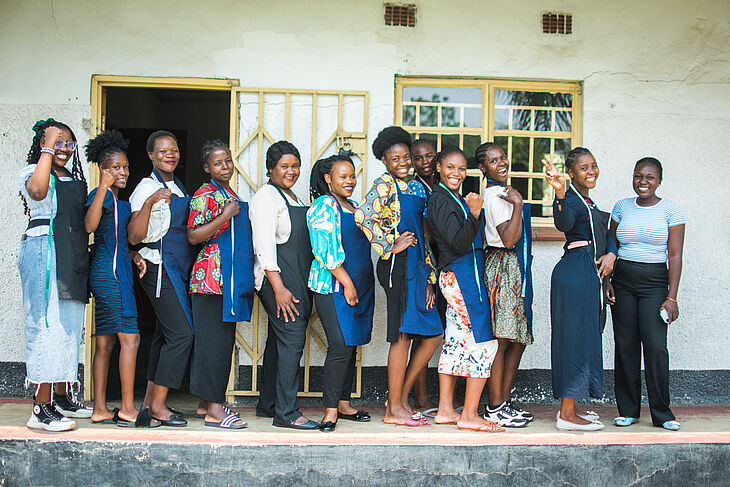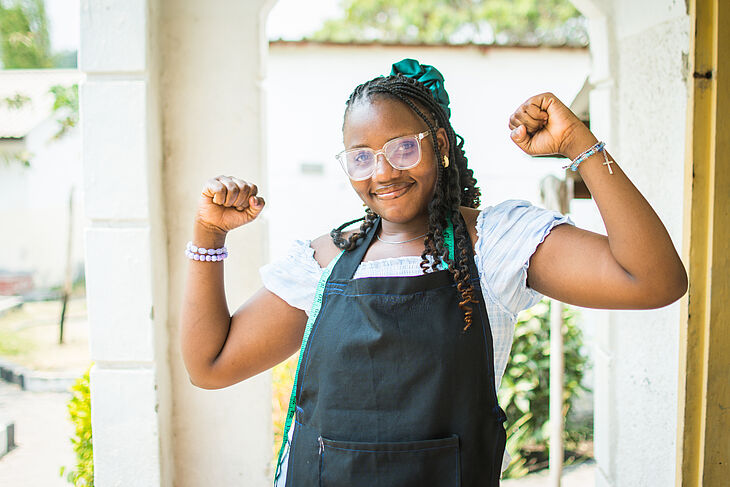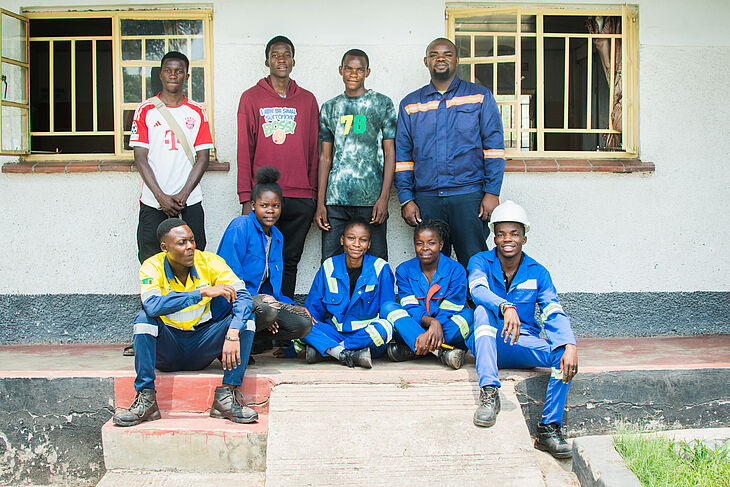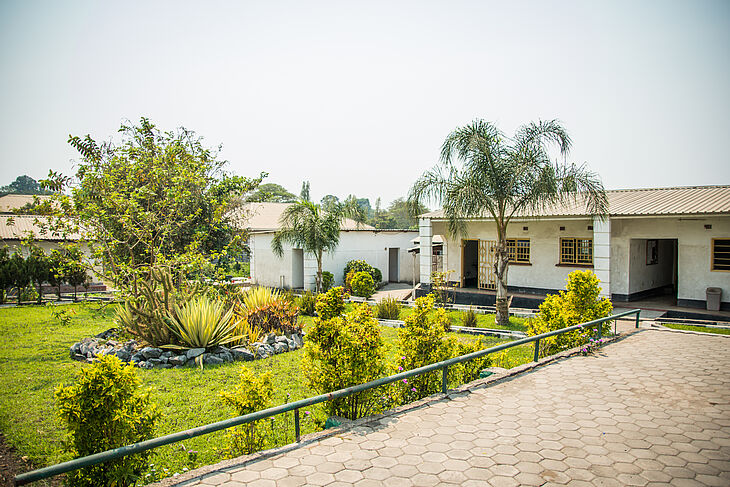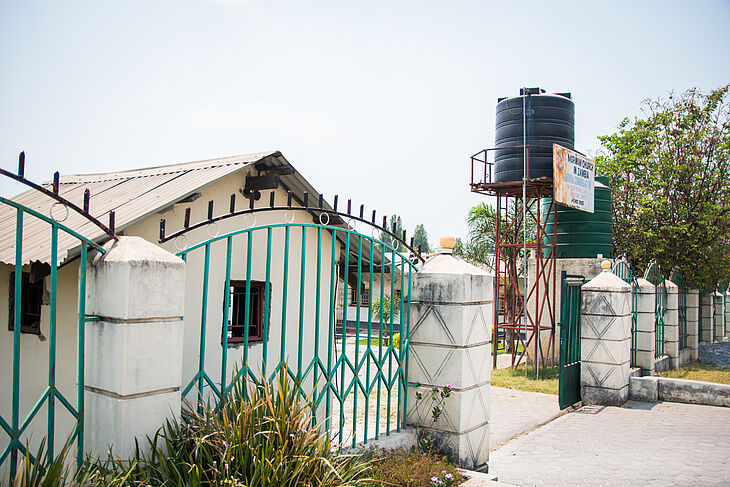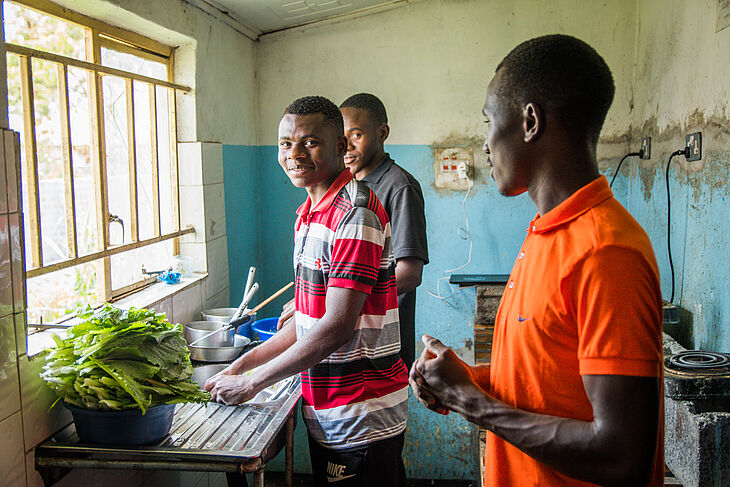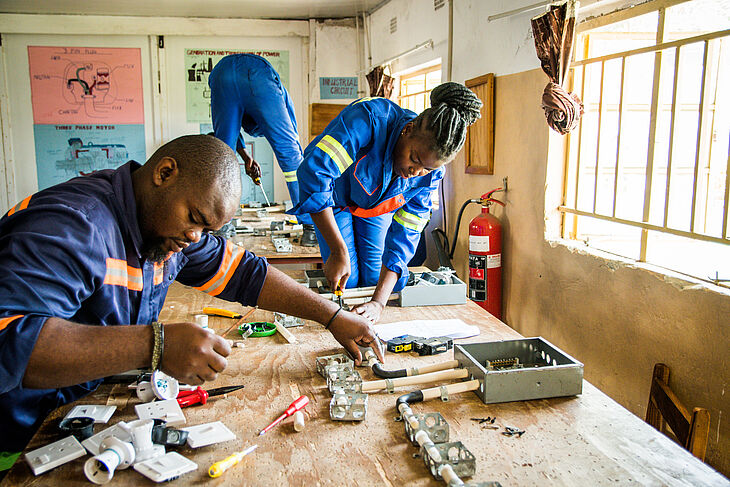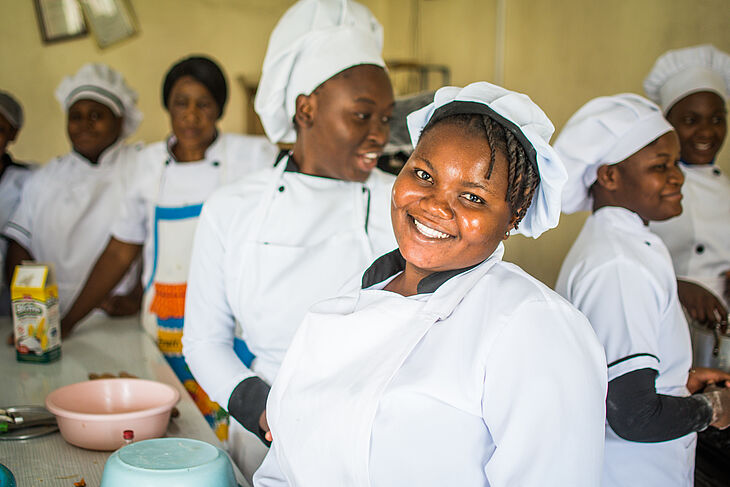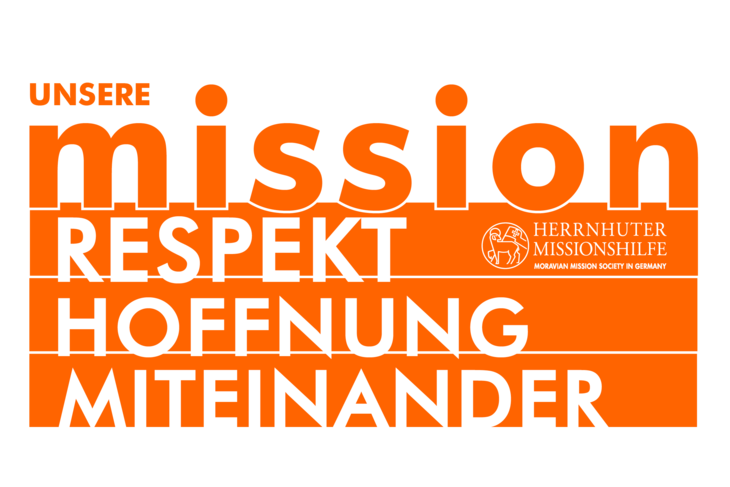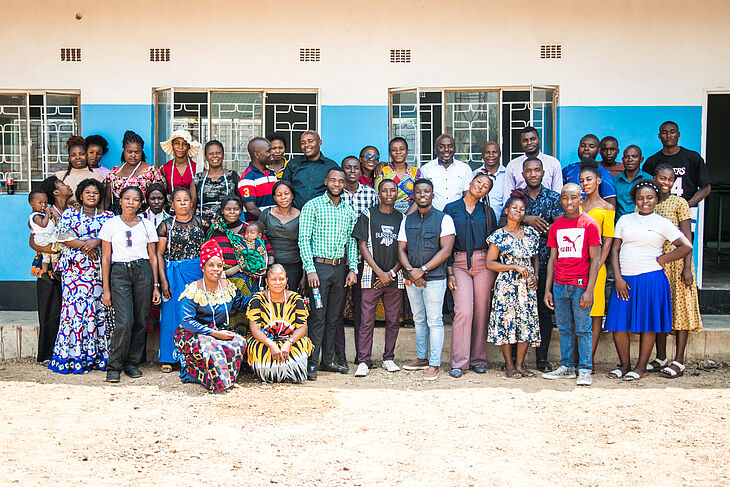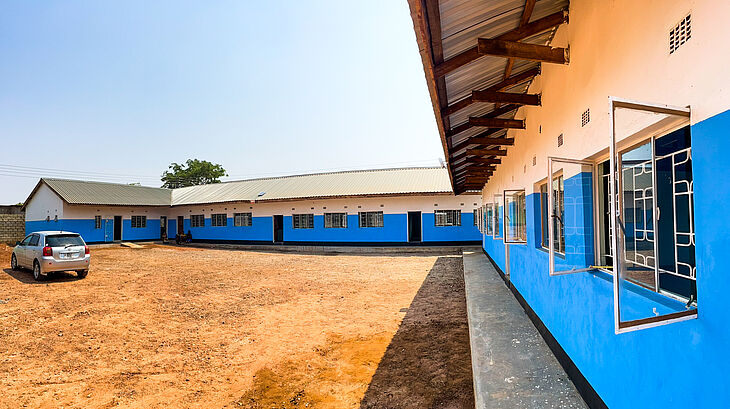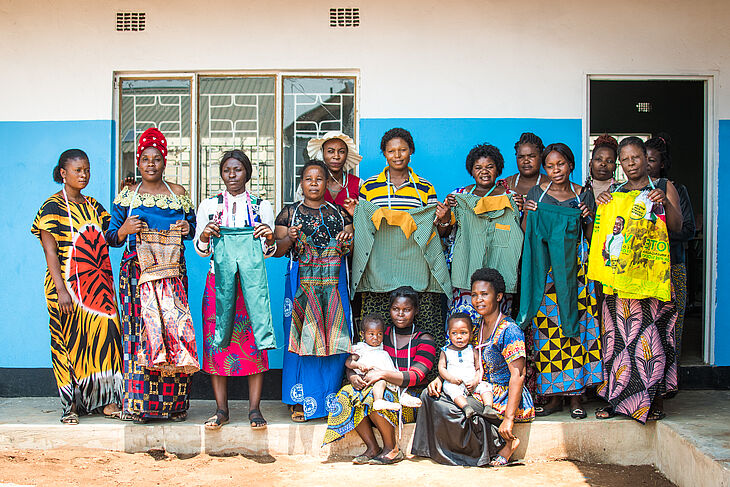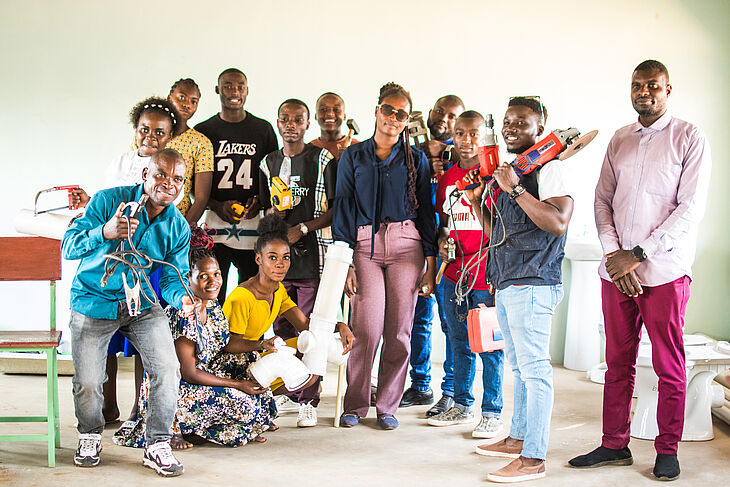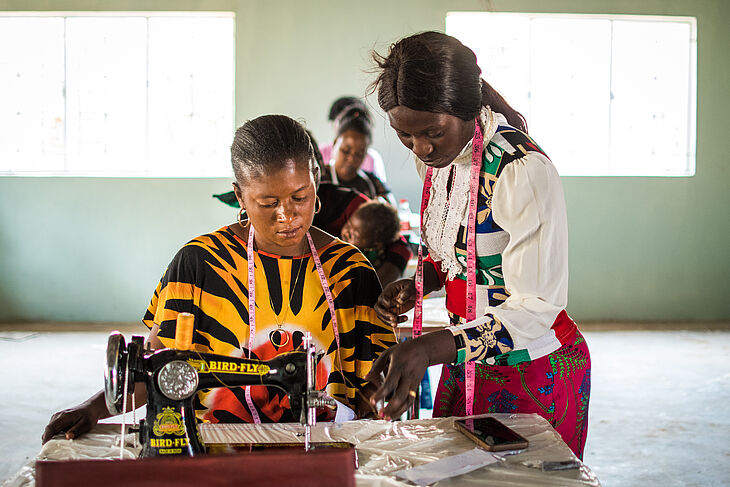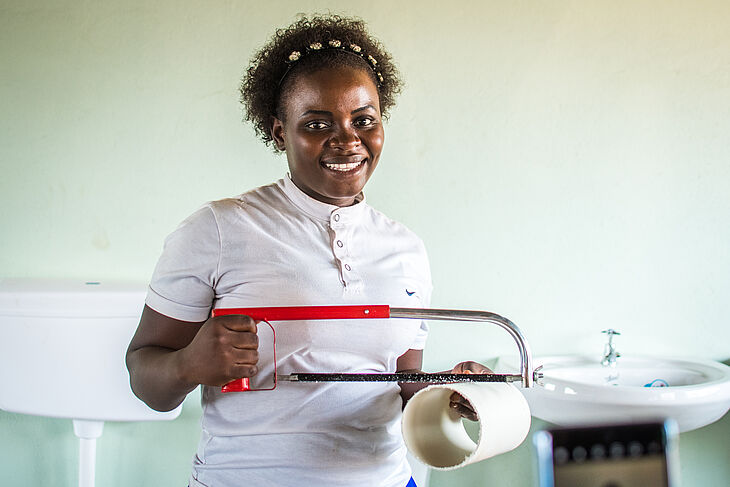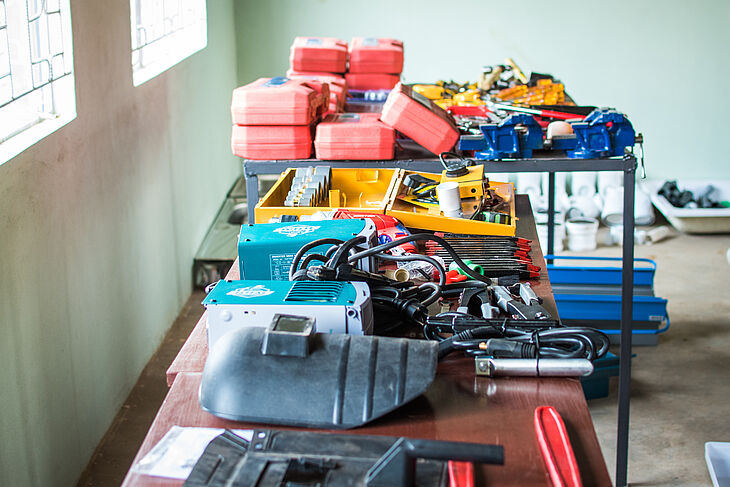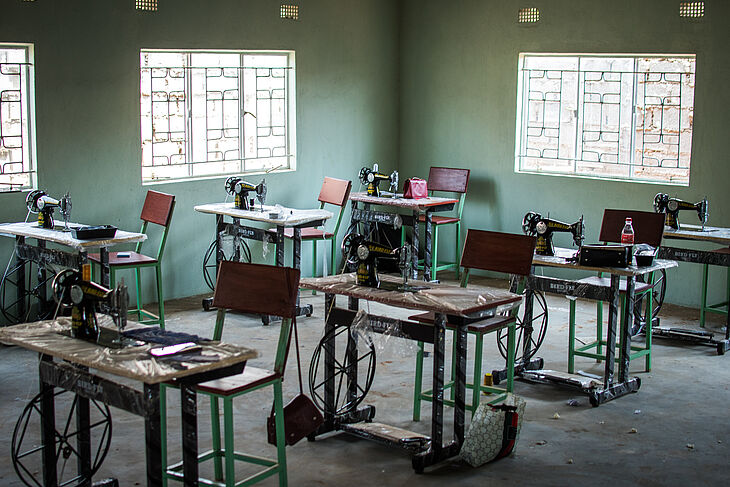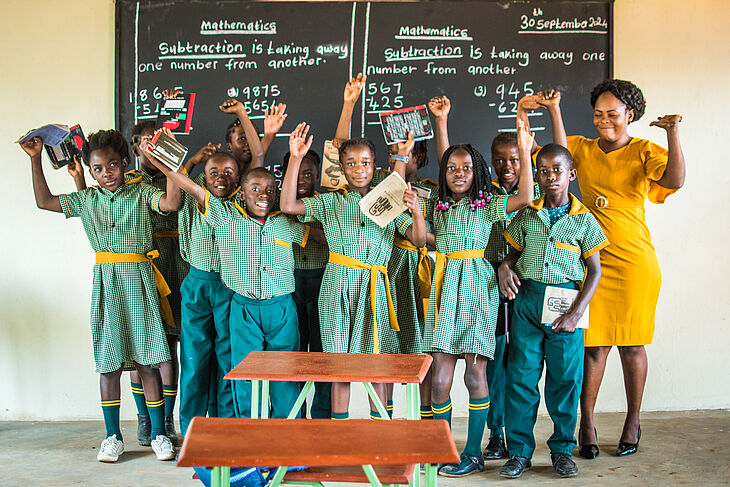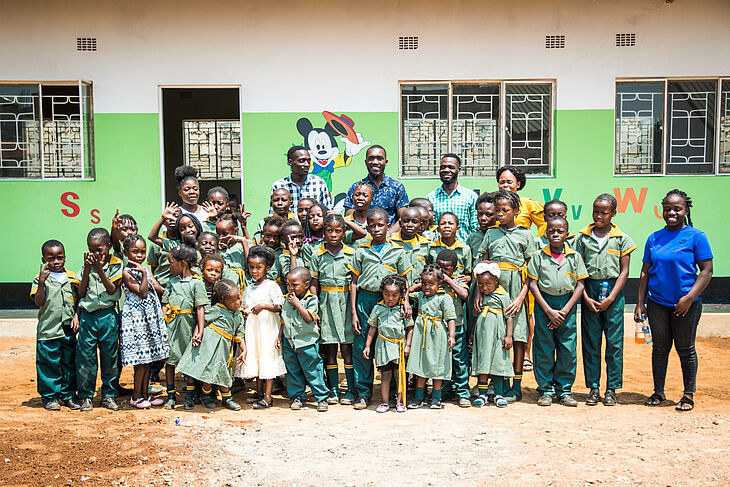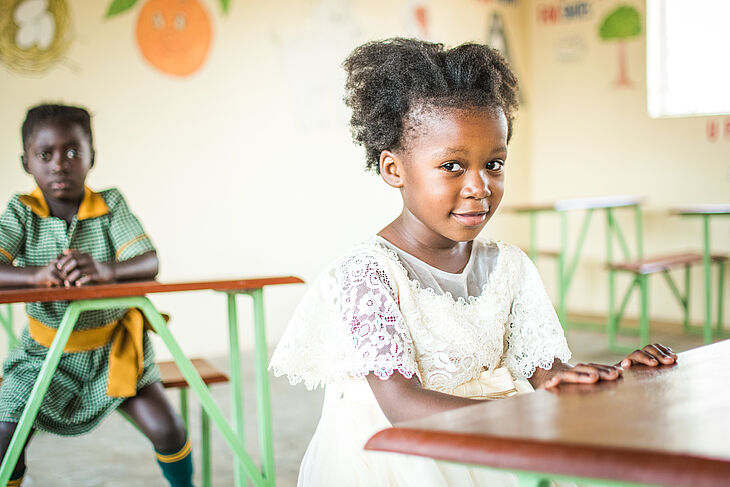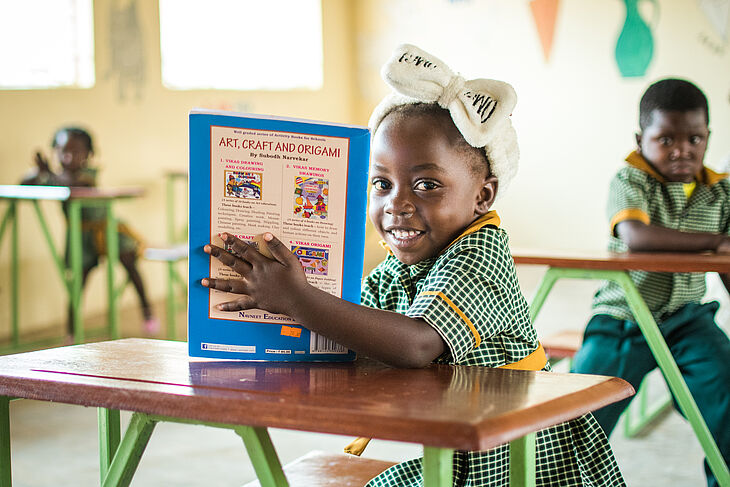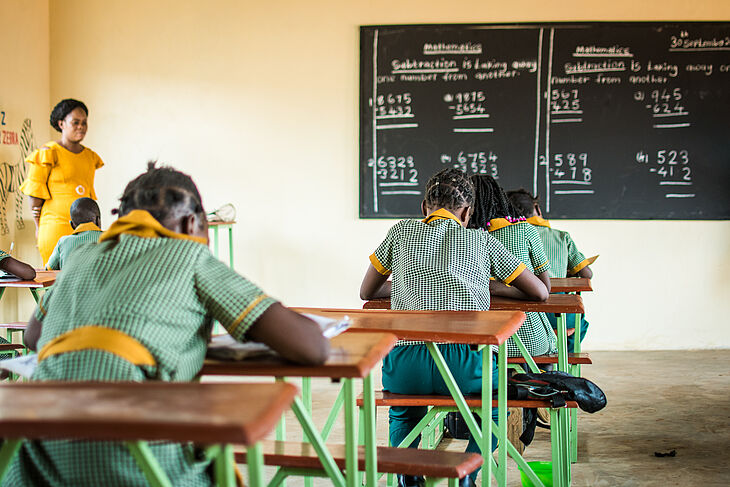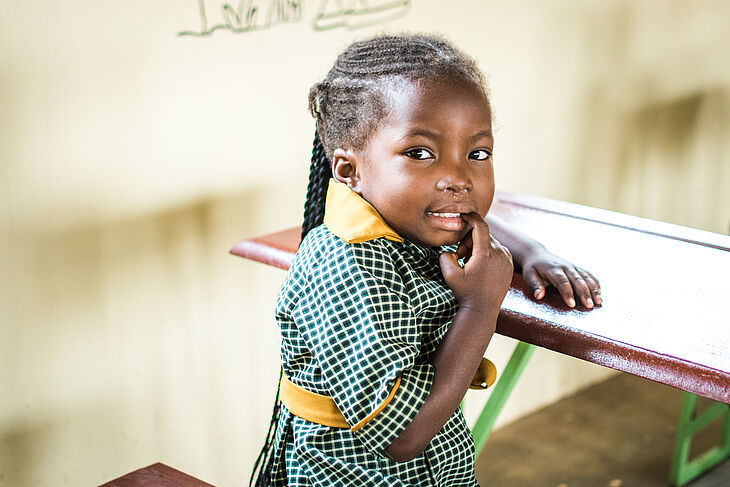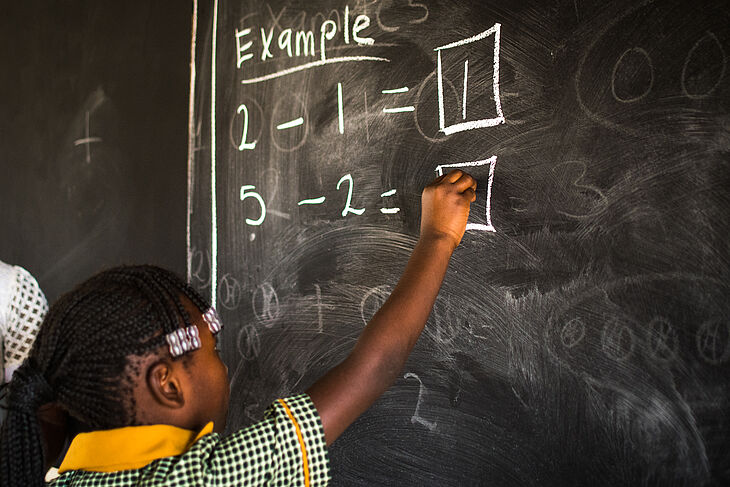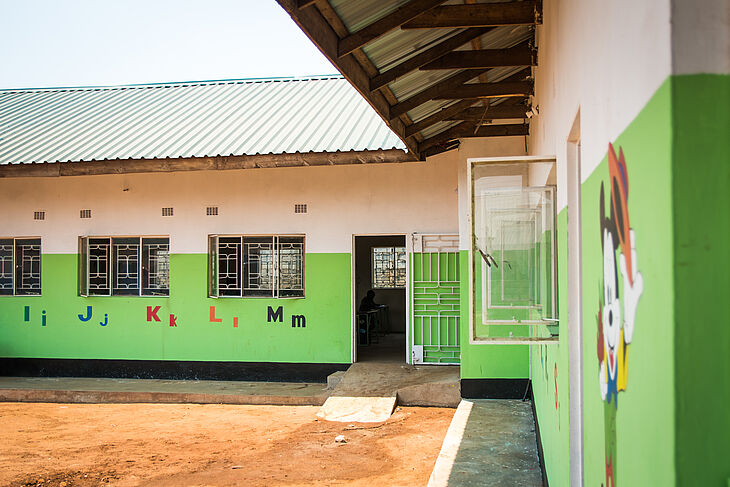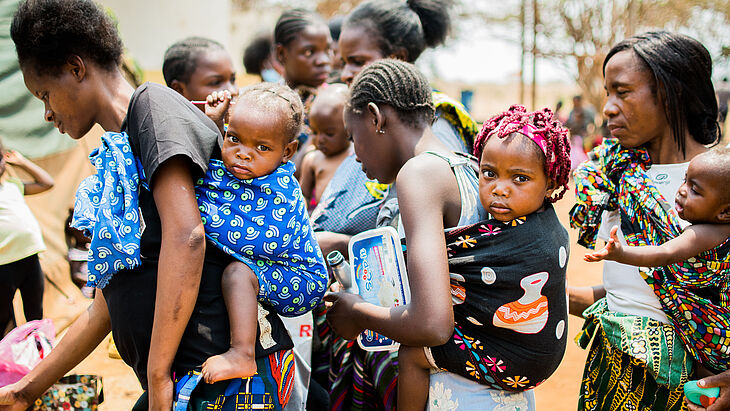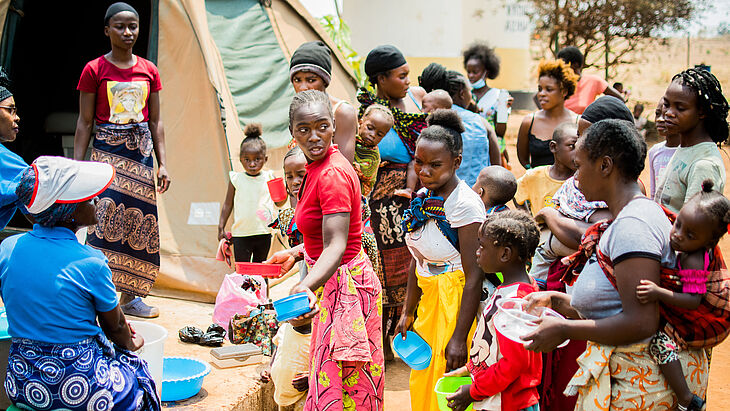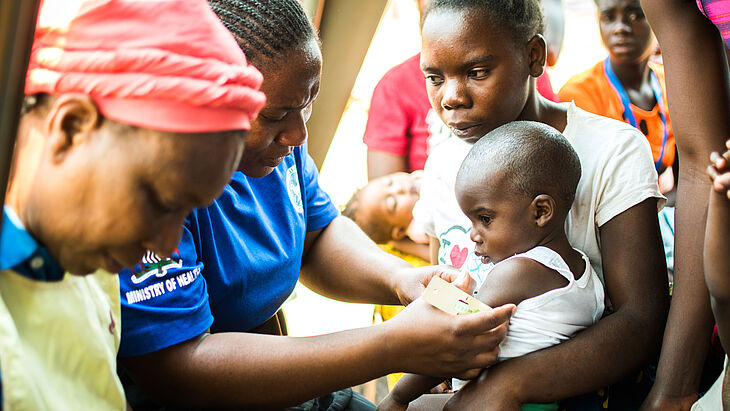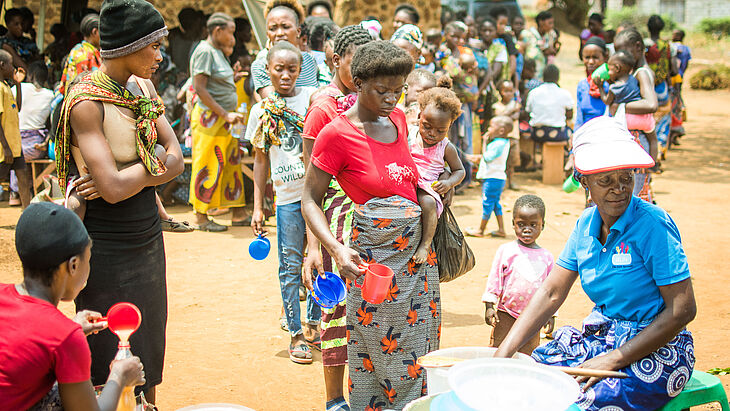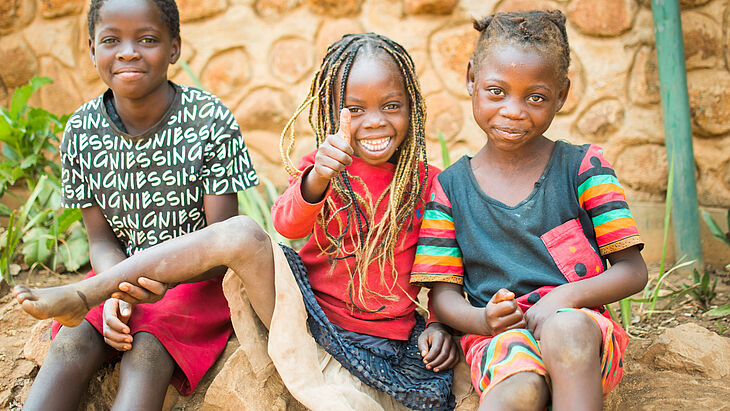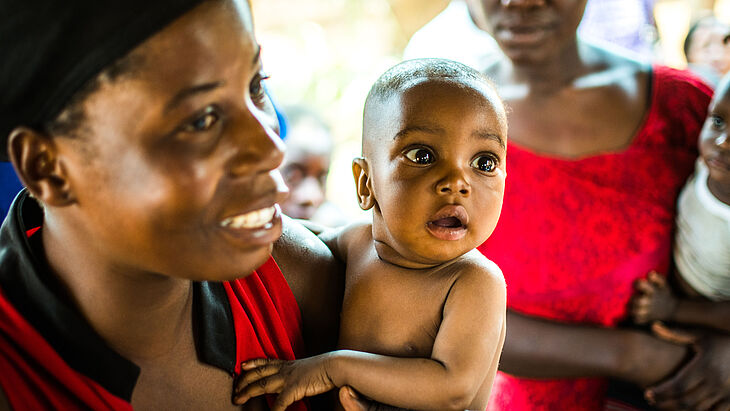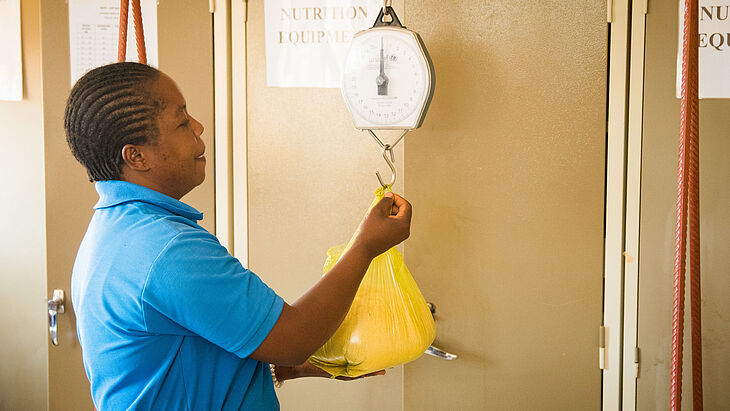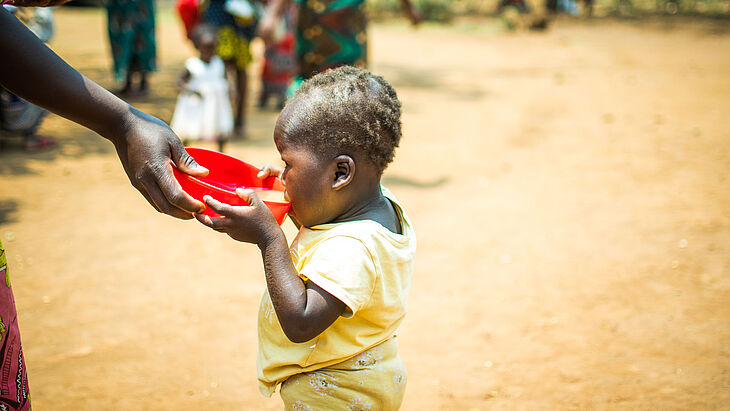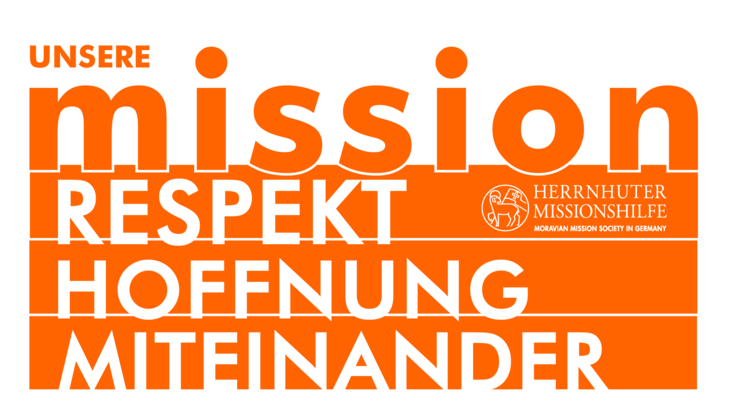Zambia

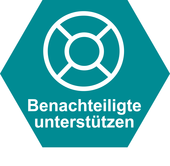
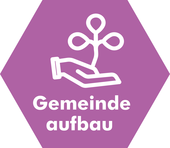
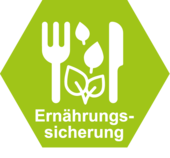
Zambia
Most of Zambia consists of plateaus between 1000 and 1400 metres above sea level. In the north is the flat Bangweulu Basin, in the centre the Copperbelt, where a lot of copper is mined. A mountain range stretches from the north-east to the south-eastern border of the country, with the highest elevation in the north being the Mafinga at 2339 metres above sea level. Western Zambia, with the headwaters of the Zambezi, is a flat sandy area of the Kalahari Desert that slopes gently to the south. The Victoria Falls in the south mark the border with Zimbabwe.
Zambia has a mild tropical climate. Due to the altitude, the savannah landscape can often experience heavy rainfall, but also longer periods of drought. Climate change exacerbates these phenomena and makes farming even more difficult. Famine and malnutrition are on the rise among the population.
The population is just under 20 million and is growing rapidly. As Zambia is around twice the size of Germany, the population density is still quite low at 25 inhabitants per square kilometre. A good 10 per cent of the population lives in the capital Lusaka. This makes it by far the largest city.
Zambia borders Tanzania to the north. The railway that transports the copper to the ports on the coast also runs through Tanzania. This is why there have always been people who live and work on one side of the border and then on the other. Many of these people came into contact with the Moravian Church in Tanzania and became members. In order to continue to look after such people, the Moravian Church in Tanzania ventured across the border to Zambia around 30 years ago. Pastors gathered people from Tanzania and other interested people joined them. This is how congregations slowly began to form. Today, the Moravian Church in Zambia has 25 congregations and around 10,000 members. The church leadership of the Unity Province of Zambia, which has been independent since 2015, is based in the capital Lusaka. In addition to church services and church work, social projects for society are an important part of the Church of the Moravian Church in Zambia.
News from the projects
Activities of the Moravian Church in Zambia
The Moravian Church in Zambia, which convened its fourth provincial synod in Lusaka in August 2025 and elected John Sichilima as the first Zambian bishop of the Moravian Church, is regularly active on Facebook. It posts reports and pictures from the life of its congregations almost daily, occasionally also excerpts from sermons (e.g., Twatasha congregation here) and videos of choir performances (see the mixed Hope choir here). Occasionally, there are also posts about events in the neighboring Tanzanian provinces, especially from the Western and Rukwa provinces. Among other things, there were detailed reports on the recent election of the church leadership in Rukwa Province (see here) and on the large women's conference in Iringa (see here). Ecumenism is also reflected from time to time in the posts of the Moravian Church in Zambia (see, for example, the transnational evangelistic initiative Palace of Prayer Assembly here).
Further training sessions for the malnutrition project in Zambia
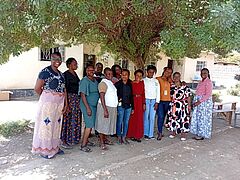
A three-day training course on infant and young child feeding (IYCF) took place at the Kazimva Clinic. Nine community volunteers from the Moravian Church in Zambia participated in order to update their knowledge and strengthen their counseling skills for their work in the congregations. The training focused on key aspects of early childhood nutrition: support for initiating breastfeeding, promotion of exclusive breastfeeding in the first months, gradual introduction of balanced complementary foods, and feeding according to need. Special attention was paid to supporting mothers in challenging situations, such as those exposed to HIV, as well as hygienic meal preparation and safe food storage. In addition, signs of growth disorders and malnutrition were discussed so that children can be referred to health services at an early stage. The training was practice-oriented. Through role-playing, case discussions, and practical exercises, participants practiced conversation skills, active listening, and structured counseling of families. In this way, the training makes a concrete contribution to sustainably improving the health of children in the congregations served.
New leadership elected for the Moravian Church in Zambia
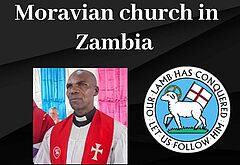
There has recently been a change in leadership at the Moravian Church in Zambia MCZ. A new team was elected to take responsibility for the work of the church in the coming years. Rev. John M. Sichilima was elected bishop. He will thus assume a central spiritual and representative role in the future. Rev. Benjamin Siwanzi will chair the church leadership, while Rev. Ruth Nakamba will take on the role of general secretary. Financial responsibilities will be in the hands of Sr. Mary K. Kimiti, who was elected treasurer. With this composition, the leadership of the MCZ is broadly based in terms of both personnel and content. The Herrnhuter Missionshilfe warmly congratulates the new leadership and wishes them wisdom and strength for the tasks ahead. We look forward to continuing our good cooperation with the MCZ and to further advancing joint projects in the areas of education, social development, and strengthening of congregations.
Malnutrition programme in Zambia
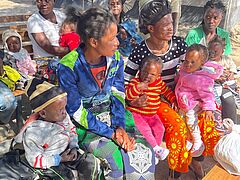
Together with Edger Teacher, Country Director in Tanzania, Bettina Nasgowitz, a representative of the Herrnhut Mission Aid, visited the Moravian Church's health project in Zambia. In 2024, thanks to the support of numerous donors, a nutrition programme for children under the age of five was launched.
More than 3,000 children received medical care and their mothers were given training on healthy nutrition. Trained health workers accompany the families, provide vaccinations and regular check-ups. However, the need remains great. Many mothers bear the responsibility alone, while numerous families live in precarious conditions. Often, there is a lack of food, income and support in everyday life. The programme therefore offers not only medical assistance, but also guidance and hope for the future.
Short excerpt from a sermon in the Moravian Church in Zambia
In June 2025, a sermon in the Moravian Church in Zambia (Twatasha congregation in the capital Lusaka) called for courageous faith following the example of the old Moravians: "Do you know how the gospel of God's love came to us? If you practised a form of Christianity that was not imbued with the gospel, then Christianity would die out with your generation. I have studied the history of the Herrnhuter Mission. They sold themselves into slavery, gave their money to charity and set off for foreign lands to preach the gospel. Are you so presumptuous as to think that you will go to heaven and sit next to them? You are jokers!" The preacher clearly believes that his listeners only have a chance of going to heaven if they emulate the testimony of the first Moravian missionaries. Watch the here.
A new start thanks to the sewing machine: Silvia's path to self-employment
Silvia M. grew up in Ndola in Zambia. In a family of eight siblings, everyday life was often characterized by challenges. But Silvia had a dream: she wanted to learn, develop and give her family a better future. But fate was not kind to her. After the early death of her father, Silvia had to drop out of school in the third grade - the family could not afford the school fees. Although she repeatedly applied for scholarships, her hopes remained unfulfilled. Instead, she worked in the fields, helped her mother and looked after her younger siblings. Silvia's path took her through many ups and downs, but one thing remained: her desire for education and a perspective. When she heard about a sewing program at the Moravian Church's vocational training center in Ndola in 2023, she seized the opportunity. There she learned the tailoring trade. Thanks to the support of Herrnhuter Missionshilfe, Silvia received her own sewing machine and start-up materials. Now she can fulfill her dream of becoming self-employed! She is working hard to set up a small sewing business - not only for herself, but also to give other women in her congregation a perspective.
New “Zambia-North America” partnership sealed
The Board of World Mission of the Moravian Church in North America wrote on Facebook on March 26, 2025: “We are pleased to announce that the Moravian Church in Zambia is now our new global partner. With this alliance we want to support the work already happening in Zambia and enable further growth. We have already supported several individual projects in Zambia, e.g. the construction of a vocational training center and a solar system for a kindergarten as well as the construction of a church. Looking to the future, we look forward to working on theological education initiatives to further qualify leaders for church ministry. We invite you to join us in praying for the Moravian Church in Zambia and for its leadership, especially for Pastor John Sichilima. Pray that the church will continue to be strong and able to minister in its congregations. A synod is due to take place in August this year. Some pictures here.
Vocational Training Center Ndola
In Zambia, too, a solid education is the basis for a start in the job market and enables young people to earn their own living. The self-esteem of the young people is strengthened by their own earnings and it enables them to live in dignity. Herrnhuter Missionshilfe therefore saw an acute need in Zambia and so the first vocational training Center outside Tanzania was established. Fred Walch, a former employee of Herrnhuter Missionshilfe, worked actively between 2017 and 2020 as project manager, among other things, to improve the educational situation in Zambia. He places a very high value on practical education. Therefore, the students of each course receive, if possible, a three-month internship, where they have the opportunity to put the knowledge they have learned into practice.
Project Pictures
The Project
At the end of May 2019, the first vocational training centre of the Moravian Church Zambia opened its doors in Ndola. The school originally started with seven trainees in the carpentry workshop and ten in the tailoring workshop. Today, the vocational school offers training capacity for around 60 young people in the fields of electrics, carpentry, tailoring and catering. The courses impart practical knowledge in order to prepare graduates for the labour market in the best possible way.
One significant advance is the new, modern kitchen area, which was set up especially for the catering course and gives the trainees practical experience in the catering sector. In addition, a new dormitory for girls has been built, enabling almost 20 more girls to live in a safe environment and complete their training.
Target groups
The vocational school is aimed at young people from Ndola and the surrounding rural regions, where many young people have limited access to education and vocational qualifications. Through the training opportunities, they can improve their economic situation and thus sustainably strengthen the living conditions in their communities.
Project Goals
- Vocational qualification: The young people receive sound training that enables them to earn their own living.
- Combating youth unemployment: In rural regions in particular, the vocational school opens up prospects for young people and helps to reduce unemployment.
- Start-up aid for self-employment: Graduates receive so-called ‘tool kits’, which make it easier for them to become self-employed and set up small craft businesses.
- Strengthening village communities: By setting up small businesses, young people contribute to economic development in their home communities.
Acivities
- Practical internships: Where possible, trainees are offered a three-month internship to apply the knowledge they have learnt in practice.
- Project days and personal responsibility: Pupils realise smaller projects on their own, such as the construction of solar systems.
- Wide range of courses: In addition to electrics, tailoring and carpentry, catering courses are offered to broaden the range of vocational fields.
- Individual counselling: Specialists are on hand to advise the trainees and support them in planning their professional future.
Project Progress
The VTC in Ndola has been able to expand its programme in recent years and take on more young people. The regular practical assignments and the new infrastructure measures, such as the new kitchen for the catering course, are constantly improving the training conditions. In addition, a borehole is currently being drilled, which will soon be equipped with a solar-powered water pump to make the vocational school less dependent on the state water supply and to make operations more sustainable. Some graduates have now opened their own small businesses and are actively contributing to the economic strengthening of their villages.
Project Managers and Project Partners
Bettina Nasgowitz | Markus Kuhn |
| Tel. +49 (0)7164 9421-22 bettina.nasgowitz@ebu.de | Tel. +49 (0)7164 9421-23 markus.kuhn@ebu.de |
in cooperation with
Moravian Church of Zambia
Vocational Training Center Lusaka
With great support, a Vocational Training Center VTC was built on the grounds of the Moravian Church Zambia in Lusaka. The construction began in June 2023 but was delayed due to heavy rains and a cholera epidemic and was completed in mid-2024.
Project Pictures
The Project
The Vocational Training Centre VTC comprises six barrier-free classrooms and is designed for around 80 to 100 young people They have been designed so that people with disabilities also have access.
Target groups
The Vocational Training Centre is aimed at severely disadvantaged young people and young adults from Lusaka and the surrounding areas. Special attention is paid to young women and people with disabilities, who are given the opportunity to receive future-oriented vocational training.
Project Goals
- To offer young people a start in the labour market through practical training.
- To strengthen the opportunities of young disadvantaged people, especially women and people with disabilities, and thus secure their livelihoods in the long term.
Acivities
- Provision of training programmes in tailoring and plumbing.
- Further training programmes such as solar electrics and electrics are planned.
- Construction of a well and installation of a water tank to ensure a safe water supply.
- Securing the site with a protective wall to provide a safe learning environment for the trainees.
Project Progress
The classrooms have been fully equipped with desks, chairs, teachers' desks and blackboards, and the toilet facilities are ready for use. The barrier-free equipment of the VTC, including ramps and wide doors, ensures unrestricted access for people with disabilities. The classrooms are equipped with sufficient sewing machines and work materials for plumbing. Thanks to the new well with water tank, the VTC also has a long-term water supply. The first trainees have been at the VTC since autumn 2024 and can learn a trade in a well-equipped and safe environment. This gives disadvantaged young people a chance for a self-determined future.
Project Managers and Project Partners
Bettina Nasgowitz | Markus Kuhn |
| Tel. +49 (0)7164 9421-22 bettina.nasgowitz@ebu.de | Tel. +49 (0)7164 9421-23 markus.kuhn@ebu.de |
in cooperation with
Moravian Church of Zambia
Kindergarten Lusaka
Education is a key to overcoming poverty. In Zambia, however, there are enormous deficits in the education sector, particularly in the area of early childhood development.
Project Pictures
The Project
The new Kindergarten offers the opportunity to provide children of pre-school age with a solid foundation for their education. The preschool is now equipped with four barrier-free classrooms and offers space for around 80 to 100 children.
Target groups
The Kindergarten is aimed at disadvantaged children from the neighbourhood in Lusaka, in particular children from poor backgrounds in the Moravian Church Zambia, girls and children with disabilities or limitations. This new kindergarten is intended to give these children access to early childhood education and thus to a dignified and independent life.
Project Goals
- Providing early childhood education for disadvantaged children to enable them to successfully enter the education system.
- Improving the quality of life of children and their families through access to education and nutritional programmes.
- Promoting hygiene and health through a secure water supply and hygienic sanitary facilities.
Acivities
- Construction and equipping of four barrier-free classrooms for around 80 to 100 children, including age-appropriate furniture.
- Construction of six toilet cubicles with barrier-free access via ramps and wide doors. Implementation of daily hygiene measures to prevent illness and school absences.
- Drilling a well and installing a water tank to secure the kindergarten's water supply and hygiene and to ensure sufficient fresh water even during the long dry periods
- Introduction of a food security programme for children under five, including healthy eating training for parents and distribution of essential staple foods.
- The entire building is supplied with electricity from renewable energy sources via a solar system and is therefore independent of the state's highly fluctuating electricity supply.
- There are also plans to build a playground in the coming months, which will provide the children with space for exercise and learning through play and will promote their motor and social skills.
Project Progress
Construction of the Kindergarten began in June 2023 and was completed after around a year despite heavy rainfall and a cholera epidemic. The kindergarten is now fully equipped and open. The first children have arrived in their school uniforms and are happily using the classrooms and outdoor facilities. The water supply from the new well is running smoothly and is making a decisive contribution to ensuring hygiene standards. The new Kindergarten gives the children from the neighbourhood the chance of a sound early childhood education and a better start to their schooling - an investment in their future and the future of the entire congregation.
Project Managers and Project Partners
Bettina Nasgowitz | Markus Kuhn |
| Tel. +49 (0)7164 9421-22 bettina.nasgowitz@ebu.de | Tel. +49 (0)7164 9421-23 markus.kuhn@ebu.de |
in cooperation with
Moravian Church of Zambia
Malnutrition Project
Malnutrition is one of the biggest challenges in southern Africa and primarily affects children under the age of five. Chronic malnutrition can lead to stunted growth, weakened immune defences and increased child mortality. Many rural regions lack both knowledge about a balanced diet and access to nutritious food. Herrnhuter Missionshilfe is therefore working in Zambia to break this cycle and promote healthy development for future generations.
Project Pictures
The Project
In cooperation with the Neri Clinic in Lusaka, Herrnhuter Missionshilfe has launched a nutrition programme to support families in and around Lusaka. A central component of the project is the training of community workers to become community health workers who carry out health and nutrition training in their respective regions. Through weekly meetings, health checks and targeted counselling, they help to raise awareness of healthy eating among the population and give children a better future.
Target groups
The nutrition programme is aimed at families and especially mothers in rural regions in and around Lusaka who are affected by acute and chronic malnutrition. The programme focuses particularly on children under the age of five, as they are especially susceptible to developmental disorders and health complications. Through regular training and support for mothers, knowledge is imparted that contributes to better health for the whole family in the long term.
Project goals
- Combating malnutrition and reducing child mortality
- Educating people about healthy eating and its importance for children's growth and development
- Supporting and guiding families so that they are able to prepare nutritious meals from local ingredients
- Long-term improvement in the health and quality of life of the target group through prevention and regular health checks
Activities
- Training of community health workers: Members of the Moravian Church Zambia are trained as community health workers by experienced medical professionals from the Neri Clinic. They carry out health checks, nutritional training and cookery courses for mothers in their communities.
- Weekly training sessions for mothers: In small groups, the mothers learn how to provide their children with nutritious meals and which foods are particularly important for their health. The training sessions also provide space for questions and the exchange of experiences.
- Health checks and nutritional supplements: The children are weighed and measured regularly to monitor their development. If necessary, the children concerned are also given nutritious food supplements to prevent deficiency symptoms or, in acute cases, are treated at the Neri Clinic.
Project progress
Thanks to the support of our donors and partners, many families have already been reached and trained. One example is the story of Gloria, a mother from a village near Lusaka, who has learned through the nutrition programme how to prepare healthy meals from local ingredients. Her children have gained weight, become healthier and more active. Through the weekly meetings and health checks, we can ensure that the children's progress is regularly monitored and help is provided immediately if needed.
Through the nutrition programme in Zambia, we aim to create long-term and sustainable improvements. Your support will enable us to continue this work and reach more families in urgent need of help. Together we can help the children in Zambia grow up healthy and have a better future ahead of them.
Project Managers and Project Partners
Bettina Nasgowitz | Markus Kuhn |
| Tel. +49 (0)7164 9421-22 bettina.nasgowitz@ebu.de | Tel. +49 (0)7164 9421-23 markus.kuhn@ebu.de |
in cooperation with
Moravian Church of Zambia
Girls need Education - Vocational Training Zambia
Herrnhuter Missionhilfe specifically supports young women in vocational training at the vocational training center in Ndola. You can find more information about this under the heading Sponsorships&Scholarships.

